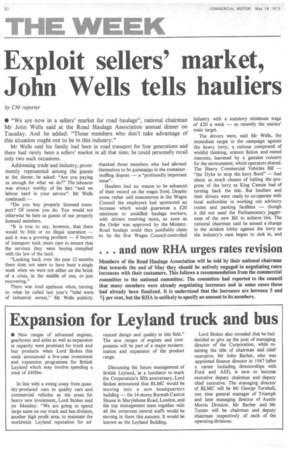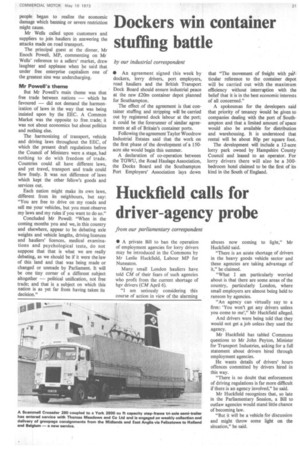Exploit sellers' market, John Wells tells hauliers
Page 22

Page 23

If you've noticed an error in this article please click here to report it so we can fix it.
by CM reporter • "We are now in a sellers' market for road haulage", national chairman Mr John Wells said at the Road Haulage Association annual dinner on Tuesday. And he added: "Those members who don't take advantage of this situation ought not to be in this industry."
Mr Wells said his family had been in road transport for four generations and there had rarely been a sellers' market in all that time; he could personally recall only two such occasions.
Addressing trade and industry, prominently represented among the guests at the dinner, he asked: "Are you paying us enough for what we do?" The labourer was always worthy of his hire "and we labour hard in your service". Mr Wells continued: —
"Do you buy properly licensed transport? Of course you do. You would not otherwise be here as guests of our properly licensed members.
"It is true to say, however, that there would be little or no illegal operation — and it was a growing problem — if buyers of transport took more care to ensure that the services they were buying complied with the law of the land.
"Looking back over the past 12 months there does not seem to have been a single week when we were not either on the brink of a crisis, in the middle of one, or just recovering."
There was loud applause when, turning to what he called last year's "tidal wave of industrial unrest," Mr Wells publicly thanked those members who had allowed themselves to be guineapigs in the containerstuffing dispute — a "profoundly important issue".
Hauliers had no reason to be ashamed of their record on the wages front. Despite some rather odd manoeuvres in the Wages Council the employers had sponsored an increase which would guarantee a £20 minimum to unskilled haulage workers, with drivers receiving more, as soon as the Order was approved by the Minister. Road haulage could then justifiably claim to be the first Wages Council-controlled industry with a statutory minimum wage of £20 a week — so recently the unions' main target.
The drivers were, said Mr Wells, the immediate target in the campaign against the heavy lorry, a curious compound of wishful thinking, science fiction and vested interests, leavened by a genuine concern for the environment, which operators shared. The Heavy Commercial Vehicles Bill — "the Dyke to stop the lorry flood" — had about as much chance of halting the progress of the lorry as King Canute had of turning back the tide. But hauliers and their drivers were ready to co-operate with local authorities in working out advisory routes and parking facilities — though it did not need the Parliamentary juggernaut of the new Bill to achieve this. The national chairman said he sensed a change in the strident lobby against the lorry as the industry's case began to sink in, and people began to realize the economic damage which banning or severe restriction might cause.
Mr Wells called upon customers and suppliers to join hauliers in answering the attacks made on road transport.
The principal guest at the dinner, Mr Enoch Powell, MP, commenting on Mr Wells' reference to a sellers' market, drew laughter and applause when he said that under free enterprise capitalism one of the greatest sins was undercharging.
Mr Powell 's theme But Mr Powell's main theme was that free trade between nations which he favoured — did not demand the harmon ization of laws in the way that was being insisted upon by the EEC. A Common Market was the opposite to free trade; it was not about economics but about politics and nothing else.
The harmonizing of transport, vehicle and driving laws throughout the EEC, of which the present draft regulations before the Council of Ministers were a stage, had nothing to do with freedom of trade.
Countries could all have different laws, and yet travel, transport and trade could flow freely. It was not difference of laws which kept the other fellow's goods and services out.
Each nation might make its own laws, different from its neighbours, but say: "You are free to drive on my roads and sell me your vehicles, but you must observe my laws and my rules if you want to do so." Concluded Mr Powell: "When in the coming months you and we, in this country and elsewhere, appear to be debating axle weights and vehicle lengths, driving licences and hauliers' licences, medical examina tions and psychological tests, do not suppose that that is what we are really debating, as we should be if it were the law of this land and that was being made or changed or unmade by Parliament. It will be one tiny corner of a different subject altogether — political unification, not free trade; and that is a subject on which this nation is as yet far from having taken its decision."
















































































































